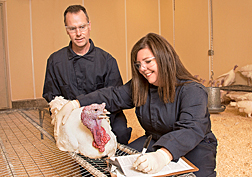| Read the magazine story to find out more. |
|
|
Salmonella Vaccine Reduces Animal Disease and Foodborne Illness
August 30, 2017
Some types of Salmonella cause disease in food animals, like pigs. Others cause foodborne illness in humans. A new vaccine developed by Agricultural Research Service (ARS) scientists in Ames, Iowa, protects against these types of Salmonella in food animals.
Most Salmonella vaccines only protect against one type of the pathogen. This leaves pigs susceptible to disease from other Salmonella pathogens. While some Salmonella vaccines reduce disease in pigs, they may not protect against Salmonella that causes foodborne illness in humans.
Microbiologists Shawn Bearson and Brad Bearson, at ARS's Food Safety and Enteric Pathogens Research Unit and ARS's Agroecosystems Management Research Unit, respectively, developed a new vaccine that protects food animals against both human and animal disease-causing Salmonella.
In experiments, the vaccine protected pigs against two types of Salmonella—Typhimurium and Choleraesuis. It also protected turkeys against Typhimurium and a multidrug-resistant Salmonella type, Heidelberg—the bacterium responsible for a 2011 outbreak in ground turkey.
Choleraesuis, the source of major U.S. and global outbreaks in swine in the 1980s and 1990s, causes a severe disease that can kill animals. According to ARS scientists, if an outbreak occurs in the United States, the new vaccine could provide protection against Choleraesuis, along with other foodborne Salmonella such as Typhimurium. The vaccine is also a DIVA—Differentiation of Infected from Vaccinated Animals—meaning it shouldn't interfere with specific tests used to detect natural Salmonella infections in pigs. Thus, a producer can differentiate vaccinated animals from those naturally exposed to Salmonella.
The scientists believe that the vaccine will protect against other types of Salmonella in addition to the three strains tested. ARS has filed a patent application for this vaccine technology.
Read more about this research in the August 2017 issue of AgResearch magazine.
For more information contact Sandra Avant, ARS Office of Communications.
The Agricultural Research Service is the U.S. Department of Agriculture's chief scientific in-house research agency. Daily, ARS focuses on solutions to agricultural problems affecting America. Each dollar invested in agricultural research results in $20 of economic impact.

